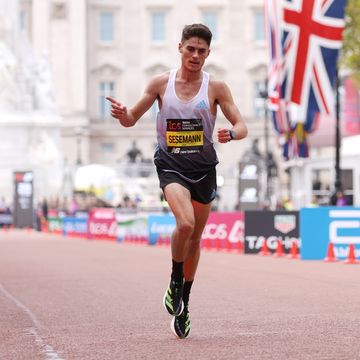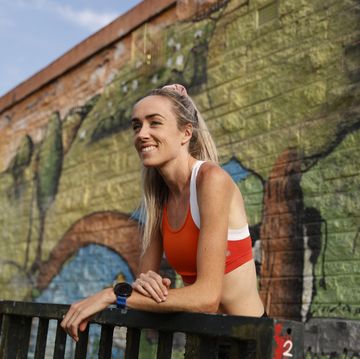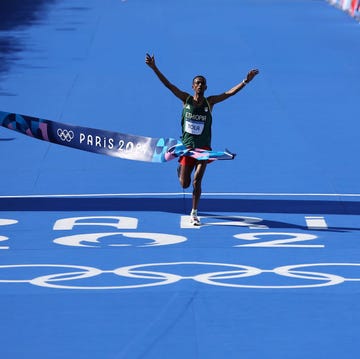Olympic bronze medallist Zharnel Hughes is not just the British 100m and 200m record holder – he is also the fastest British man that history has ever seen.
And he has 2023 to thank for this title. In June that year, he smashed Linford Christie’s 30-year-old 100m record at the New York City Grand Prix with a time of 9.83 seconds – a result that was a small but significant 0.04 seconds quicker than Christie’s. According to Hughes, he’d written down his winning time in a notebook on the morning of the race, then successfully manifested it.
A month later, he repeated his record-breaking feat for double the distance. On the morning of his 200m race at the London Diamond League, he wrote ‘19.73’ in his notebook – the time that he predicted he would run for 200m, which would break John Regis’ British record from 1993. And did he break Regis’ mark? Yes – by a fine 00.01 seconds. It would seem that fortune telling, alongside sprinting, is one Hughes’ strong points.
Fast-forward to the 2024 Olympic Games and Hughes was back fighting for a place on the podium. Having been disqualified from both the 100m and 4 x 100m relay at the Tokyo Games three years earlier, he was hungrier than ever before for that elusive Olympic medal – although his campaign in Paris was off to a shaky start. He failed to progress from his 100m semi-final, then a hamstring complaint then ruled him out of the 200m draw altogether.
But, the 4 x 100m was yet to come. Although injury scares kept Hughes away from the track for the first round, he stepped in – hamstring strapped – to run the all-important fourth leg for the final on 9 August. Looking strong and controlled, Hughes crossed the line third to claim an almighty bronze for his British team.
‘I’d just like to say that this is for the youths,’ reflected Hughes, with his Team GB 4 x 100m relay squad, after the race. ‘We’ve inspired you. We came out at the big pinnacle that is the Olympics and we wanted to deliver. So I hope that this has inspired many youths back home – and just know that whatever you put your mind to, you can achieve it. I’m super proud of these guys.’
And yet, like most athletes who have reached a world podium, Hughes has endured several lows alongside these highs – here’s a snapshot of his running journey so far.
Early days in Anguilla
Hughes was born in Anguilla, a small Caribbean island where there were no conventional running track. As a result, he began his running career sprinting on grass.
He first discovered his talent at the age of 10, when he participated in an event to mark Commonwealth Day and won a number of races. Four years later, he was representing Anguilla at the CARIFTA Games – and then, at the 2011 Commonwealth Youth Games, he made the 100m final. A year later, he was selected to represent Anguilla at the 2012 World Junior Championships and was a semi-finalist.
At the age of 16, he was awarded a scholarship to attend the IAAF’s Regional High Performance Training Centre in Jamaica, which saw him move to the island and begin studying at Kingston College. Two years later and he broke Yohan Blake’s 100m junior record at the Jamaican Championships. Looking back on the moment, Hughes said that this was the first time that he truly realised his sprinting talent. ‘I ran 10.12 at 18 years old, then literally jogged 20.32 over the 200 metres,’ he told GQ in an interview. ‘That’s when I noticed that I’m really good at this. Coach Mills saw that time and he was stunned.’
He was, of course, referring to Glen Mills – renowned coach to the greatest 100m runner of all time, Usain Bolt. Hughes had began working with Mills that same year, aged 18, while part of the same track club as Bolt, as well as Jamican sprint legends Yohan Blake and Warren Weir.
Senior career
In 2015, Hughes made his Diamond League debut at the Adidas Grand Prix in New York, finishing just 0.03 seconds behind training partner Bolt – then a six-time Olympic gold medallist – in the 200m race.
As Anguilla is a British Overseas Territory, it’s not in itself recognised by the International Olympic Committee, so Hughes was always eligible to compete for Team GB. ‘I have always known that if I was to run at the Olympics, it would be in a British vest and that is how I have always dreamt it would be,’ he said.
But his first Olympic campaign in 2016 never got off the ground. In fact, it actually stayed on the ground, as he fell during a 200m race and tore a ligament in his right knee in the process. This injury left him unfit to compete and wrote off the majority of his 2016 and 2017 season. Indeed, he finished in a disappointing seventh place in the 200m semi-final at the 2017 World Championships in London, as he was running while still not fully recovered.
Thankfully, the tide turned for Hughes in 2018. Despite disappointment at the Commonwealth Games – where he won the 200m final but was disqualified for impeding another runner – he rebounded to win the 4 x 100m relay alongside his teammates. Then, later that summer, he clinched a gold medal at Berlin’s European Athletics Championships in both the 100m and 4 x 100m relay.
Similarly, 2019 was another unpredictable year for Hughes. While he made it through to the 100m final of the World Championships in Doha, he only finished sixth – but then came fighting back to pick up a silver medal in the 4 x 100m relay.
Olympic heartbreak
When his opportunity to compete at the 2020 Olympic Games in Tokyo came around, however, he suffered his biggest career blow to date. Here, on the biggest sporting stage on earth, Hughes became the first British man to secure a place in the men’s 100m final in 21 years – and yet, at the moment that mattered most, he was disqualified for a false start. Then, despite being part of the British 4 x 100m relay squad that placed second overall, the team was later disqualified because CJ Ujah – one of the quartet – was found guilty of doping.
‘It was very difficult,’ Hughes told GQ. ‘I didn’t know if I wanted to continue, but there’s a born desire within me to accomplish these things – and despite what I’ve been through, there’s still light at the end of the tunnel that I’m willing to chase. I want to unlock my true potential.’
World Championships triumph
Unwilling to be defeated by his tough experience in Tokyo, Hughes knuckled down to be even better than before. And his appetite for glory translated into a commitment to sprinting that certainly paid off.
In 2023, Hughes went full send to reset the British 100m and 200m records within the space of a few weeks, having scored 9.83 seconds and 19.73 seconds for the two distances respectively. Clearly on a roll, Hughes then built upon these records with a sterling performance at the 2023 World Championships in Budapest, where the British sprinter clinched his first global individual medal – a bronze in the 100m.
Clocking 9.88 seconds in the tight 100m final at the World Championships, he finished third behind US athlete and 100m sprint king Noah Lyles, who ran 9.83 to take the top spot, and Letsile Tebogo of Botswana, who placed second in the same time as Hughes.
‘I’m super, super, super grateful right now,’ Hughes, who says his faith is hugely important to him, Hughes won bronze in the 100m at the 2023 World Championships afterwards. ‘God first and first. God, thank you. Thank you to my team, thank you to my coach. Thank you to Linford [Christie] as well – he gave me a talk. This one’s for you guys back home. This one means the world to me.’
It marked the first time in 20 years that a British man had made the 100m podium at a World Championships – and set the scene for the stunning Olympic medal that was to come his way in Paris the following summer.















